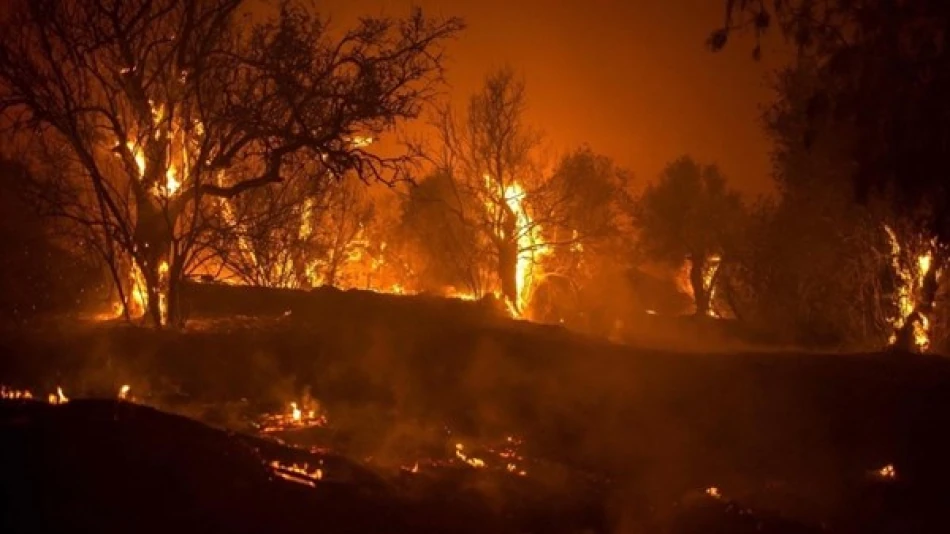
Greece Battles Escalating Wildfires as Blazes Ravage the Nation
Greece Battles Widespread Wildfires as Tourism Season Peaks, Climate Crisis Intensifies
Greece is confronting a dangerous escalation of wildfires across its most prized tourist destinations, forcing authorities to issue the second-highest fire alert level for nearly one-third of the country. The blazes, fueled by powerful winds and extreme heat, threaten to disrupt the critical summer tourism season that generates roughly 20% of Greece's GDP, while highlighting the Mediterranean's growing vulnerability to climate-driven disasters.
Fire Emergency Grips Key Tourist Regions
The Greek Civil Protection Ministry raised fire alert levels on Tuesday as flames spread across multiple iconic destinations. Nearly the entire Peloponnese peninsula—home to ancient Olympia and countless archaeological treasures—faces severe fire risk, along with the northwestern coast and popular islands including Lesbos, Samos, and the Halkidiki peninsula.
On Zakynthos, known internationally for its pristine beaches and loggerhead turtle nesting sites, residential areas came under direct threat as fires advanced toward populated zones. Meanwhile, blazes continue to rage in the Phocis region north of the Peloponnese and on Kefalonia island, though these areas currently pose no immediate danger to communities.
Wind Conditions Create Perfect Storm
Meteorologists warn that strong winds capable of transforming minor sparks into major conflagrations will persist across affected regions for several days. This weather pattern mirrors the conditions that have made Greece increasingly fire-prone, with wind speeds potentially reaching 60-70 kilometers per hour in vulnerable areas.
Tourism Industry Under Pressure
The timing could hardly be worse for Greece's tourism-dependent economy. July and August represent peak season, when millions of visitors generate crucial revenue for hotels, restaurants, and local businesses still recovering from pandemic losses. The country welcomed over 30 million tourists in 2023, with many drawn specifically to the regions now under fire threat.
Travel disruptions are already emerging: Ferry services to affected islands face potential cancellations, while tour operators must consider evacuation plans for popular destinations. The reputational impact extends beyond immediate safety concerns—repeated fire emergencies could reshape tourist perceptions of Greece as a reliable summer destination.
Mediterranean Fire Crisis Deepens
Greece's current emergency reflects a broader Mediterranean crisis. Spain, Italy, and southern France have all experienced increasingly severe fire seasons, with 2023 marking one of the worst years on record. The European Union's Copernicus Climate Change Service reported that Mediterranean countries now face fire seasons extending well beyond traditional summer months.
Infrastructure and Response Challenges
Unlike wealthier nations with extensive aerial firefighting fleets, Greece relies heavily on EU assistance and international cooperation during major emergencies. The country has invested in early warning systems and expanded its firefighting capabilities since devastating 2018 blazes killed over 100 people near Athens, but resource limitations remain evident when multiple regions burn simultaneously.
The current crisis tests Greece's improved coordination between emergency services, military units, and European partners. Success or failure in containing these fires will likely influence future EU funding for Mediterranean fire prevention programs.
Economic and Environmental Stakes
Beyond immediate tourism impacts, widespread fires threaten Greece's agricultural sector and unique ecosystems. The Peloponnese produces significant olive oil and wine exports, while affected islands support rare species found nowhere else in Europe.
Insurance and investment implications are mounting: Property insurers face growing exposure in fire-prone regions, while sustainable tourism investors increasingly factor climate risks into Mediterranean projects. The repeated cycle of fire emergencies may accelerate shifts toward more resilient tourism models and fire-resistant infrastructure development.
As Greece battles these latest blazes, the crisis underscores how climate change transforms traditional risk calculations for governments, businesses, and travelers across southern Europe. The country's response will serve as a critical test case for Mediterranean nations grappling with similar challenges in an era of intensifying extreme weather.
Most Viewed News

 Layla Al Mansoori
Layla Al Mansoori






